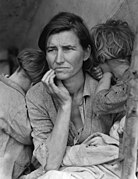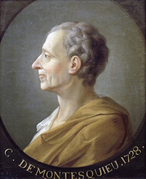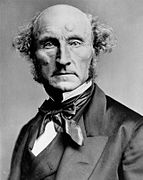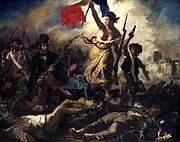Portal:Liberalism
Liberalism is a political and moral philosophy based on the rights of the individual, liberty, consent of the governed, political equality, right to private property and equality before the law. Liberals espouse various and often mutually warring views depending on their understanding of these principles but generally support private property, market economies, individual rights (including civil rights and human rights), liberal democracy, secularism, rule of law, economic and political freedom, freedom of speech, freedom of the press, freedom of assembly, and freedom of religion, constitutional government and privacy rights. Liberalism is frequently cited as the dominant ideology of modern history.
Liberalism became a distinct movement in the Age of Enlightenment, gaining popularity among Western philosophers and economists. Liberalism sought to replace the norms of hereditary privilege, state religion, absolute monarchy, the divine right of kings and traditional conservatism with representative democracy, rule of law, and equality under the law. Liberals also ended mercantilist policies, royal monopolies, and other trade barriers, instead promoting free trade and marketization. Philosopher John Locke is often credited with founding liberalism as a distinct tradition based on the social contract, arguing that each man has a natural right to life, liberty and property, and governments must not violate these rights. While the British liberal tradition has emphasized expanding democracy, French liberalism has emphasized rejecting authoritarianism and is linked to nation-building. (Full article...)
Right-libertarianism, also known as libertarian capitalism, or right-wing libertarianism, is a libertarian political philosophy that supports capitalist property rights and defends market distribution of natural resources and private property. The term right-libertarianism is used to distinguish this class of views on the nature of property and capital from left-libertarianism, a type of libertarianism that combines self-ownership with an egalitarian approach to property and income. In contrast to socialist libertarianism, right-libertarianism supports free-market capitalism. Like most forms of libertarianism, it supports civil liberties, especially natural law, negative rights, the non-aggression principle, and a major reversal of the modern welfare state.
Right-libertarian political thought is characterized by the strict priority given to liberty, with the need to maximize the realm of individual freedom and minimize the scope of public authority. Right-libertarians typically see the state as the principal threat to liberty. This anti-statism differs from anarchist doctrines in that it is based upon strong individualism that places less emphasis on human sociability or cooperation. Right-libertarian philosophy is also rooted in the ideas of individual rights and laissez-faire economics. The right-libertarian theory of individual rights generally follows the homestead principle and the labor theory of property, stressing self-ownership and that people have an absolute right to the property that their labor produces. Economically, right-libertarians make no distinction between capitalism and free markets and view any attempt to dictate the market process as counterproductive, emphasizing the mechanisms and self-regulating nature of the market whilst portraying government intervention and attempts to redistribute wealth as invariably unnecessary and counter-productive. Although all right-libertarians oppose government intervention, there is a division between anarcho-capitalists, who view the state as an unnecessary evil and want property rights protected without statutory law through market-generated tort, contract and property law; and minarchists, who support the need for a minimal state, often referred to as a night-watchman state, to provide its citizens with courts, military, and police. (Full article...)David Lloyd George, 1st Earl Lloyd-George of Dwyfor, OM, KStJ, PC (17 January 1863 – 26 March 1945) was Prime Minister of the United Kingdom from 1916 to 1922. A Liberal politician from Wales, he was known for leading the United Kingdom during the First World War, for social-reform policies (including the National Insurance Act 1911), for his role in the Paris Peace Conference, and for negotiating the establishment of the Irish Free State. He was the last Liberal prime minister; the party fell into third-party status during the last years of his premiership.
Young Lloyd George gained a reputation as an orator and a proponent of a Welsh blend of radical Liberal ideas, which included support for Welsh devolution, for the disestablishment of the Church of England in Wales, for equality for labourers and tenant farmers, and for reform of land ownership. In 1890 he narrowly won a by-election to become the Member of Parliament for Caernarvon Boroughs, in which seat he remained for 55 years. He served in Henry Campbell-Bannerman's cabinet from 1905. After H. H. Asquith succeeded to the premiership in 1908, Lloyd George replaced him as Chancellor of the Exchequer. To fund extensive welfare reforms he proposed taxes on land ownership and high incomes in the "People's Budget" (1909), which the Conservative-dominated House of Lords rejected. The resulting constitutional crisis was only resolved after two elections in 1910 and the passage of the Parliament Act 1911. His budget was enacted in 1910, and the National Insurance Act 1911 and other measures helped to establish the modern welfare state. In 1913, he was embroiled in the Marconi scandal, but he remained in office and promoted the disestablishment of the Church of England in Wales until 1914, when its implementation was suspended in response to the outbreak of the First World War. (Full article...)List of selected biographies
|
|---|
The following Wikimedia Foundation sister projects provide more on this subject:
-
Commons
Free media repository -
Wikibooks
Free textbooks and manuals -
Wikidata
Free knowledge base -
Wikinews
Free-content news -
Wikiquote
Collection of quotations -
Wikisource
Free-content library -
Wikiversity
Free learning tools -
Wiktionary
Dictionary and thesaurus


























































